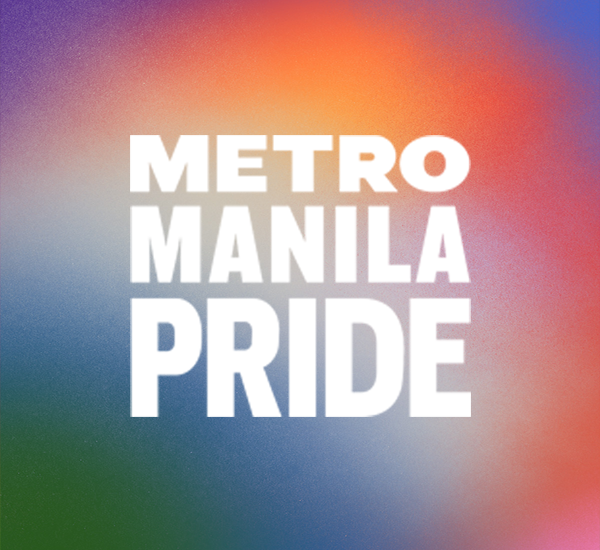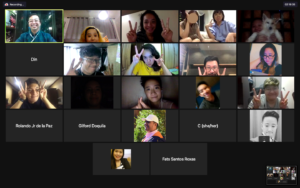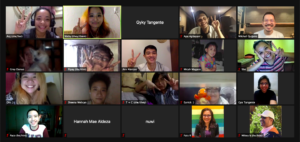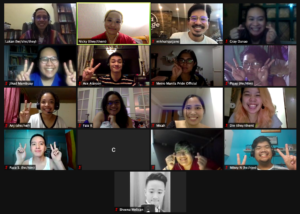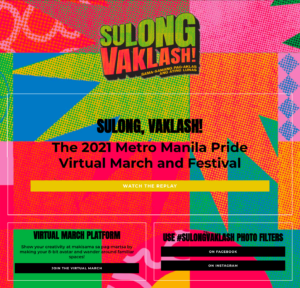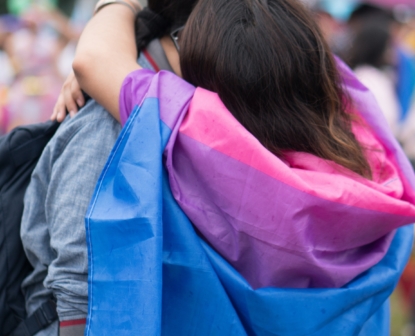Project
Equip, Educate, and Empower to Action
-
Amount Funded
25,000 EUROProject Duration
25 Oct 2019 - 24 Oct 2020 -
-
Lead organisation
-
Metro Manila Pride is a non-profit, non-governmental organisation that educates, equips and empowers the LGBTQIA+ Filipino and their communities to work towards a future that recognises and respects the rights of LGBTQIA+ persons to a dignified life without discrimination and prejudice. The organisation is committed to the following:
- Human Rights: We move, act, and decide with human rights as our compass and north star. Justice and intersectionality are at the core of our activism.
- Nurturing Learning: We value constant growth and learning as activists who seek continuous education. We offer communications and activities that inform, listen, and encourage.
- Sustainable Action: We focus on effective actions that are impactful, adaptable, and sustainable.
- Accountability and Transparency: We have integrity and credibility in dealing with our external partners, as well as our internal organisational processes.
- Inclusive collaboration: We make it easy for people and groups to participate and collaborate with us regardless of capability and background.
-
Organisation
Metro Manila Pride is a non-profit, non-governmental organisation that educates, equips and empowers the LGBTQIA+ Filipino and their communities to work towards a future that recognises and respects the rights of LGBTQIA+ persons to a dignified life without discrimination and prejudice. The organisation is committed to the following:
- Human Rights: We move, act, and decide with human rights as our compass and north star. Justice and intersectionality are at the core of our activism.
- Nurturing Learning: We value constant growth and learning as activists who seek continuous education. We offer communications and activities that inform, listen, and encourage.
- Sustainable Action: We focus on effective actions that are impactful, adaptable, and sustainable.
- Accountability and Transparency: We have integrity and credibility in dealing with our external partners, as well as our internal organisational processes.
- Inclusive collaboration: We make it easy for people and groups to participate and collaborate with us regardless of capability and background.
-
Project
The Equip, Educate, and Empower to Action project trains LGBTQIA+ human rights advocates to use an intersectional approach in their activism. Metro Manila Pride has found out that many of the people they reach are hungry for opportunities to learn about human rights and about the specific issues being faced as LGBTQI+ people. However, there are limited opportunities for them to learn about this as most of those are young LGBTQI+ people who do not belong to LGBTQI+ organisations. In this project, Metro Manila Pride (MMPride) makes educational human rights spaces more accessible to young people, many of whom are potential LGBTQI+ rights advocates waiting to be moved to action. Aside from learning about local LGBTQI+ issues, they are also integrating other local human rights issues, especially with the increasingly dangerous human rights situation in the Philippines. MMPride strives to ensure more LGBTQI+ human rights advocates understand how the oppression of other marginalised groups intersect with their own and why it is imperative to reach across sectors and stand in solidarity against the human rights violations.
-
The Equip, Educate, and Empower to Action project trains LGBTQIA+ human rights advocates to use an intersectional approach in their activism. Metro Manila Pride has found out that many of the people they reach are hungry for opportunities to learn about human rights and about the specific issues being faced as LGBTQI+ people. However, there are limited opportunities for them to learn about this as most of those are young LGBTQI+ people who do not belong to LGBTQI+ organisations. In this project, Metro Manila Pride (MMPride) makes educational human rights spaces more accessible to young people, many of whom are potential LGBTQI+ rights advocates waiting to be moved to action. Aside from learning about local LGBTQI+ issues, they are also integrating other local human rights issues, especially with the increasingly dangerous human rights situation in the Philippines. MMPride strives to ensure more LGBTQI+ human rights advocates understand how the oppression of other marginalised groups intersect with their own and why it is imperative to reach across sectors and stand in solidarity against the human rights violations.
-
In light of the socio-political situation of the country with respect to LGBTQIA+ rights and in recognition of the bleak future of the SOGIE Equality Bill in both the Senate and Congress,
the most important thing MM Pride set out to accomplish is to organize, educate, and mobilize communities to craft, pass, and monitor the implementation of SOGIESC-protection policies at different levels. With the escalating issue on SOGIESC-based violence, it is clear that there is a need develop a policy toolkit that addresses issues of both discrimination and violence. There is currently no group that focuses on this in the Philippines despite the alarming levels of violence that the community faces. We believe that this was a blind spot or missed opportunity in our project with Voice.
Metro Manila Pride’s Empowerment project was able to achieve the following:
Digital Camp: In order to adjust to the pandemic, the Human Rights Camp was turned into a series of online lectures. The digital lectures covered sessions on human rights concepts to help broaden the education of LGBTQIA+ youth organizers in the Philippines. They furthered the results of the Camp through a praxis approach. Community visits were arranged with select communities. Commitments for collaborations with the urban poor LGBTQIA+ communities were discussed at the visits. A culminating night was arranged to conclude the Camp.
Website revamp: The website was created by MMPride both for the visibility of the organization and as a learning platform. Their learning materials are available on the website, such as articles, learning resources, statements, videos, live events, a virtual game for online gathering, and others. After a year in development, the website was launched on May 16, 2021.
Pride March Manual which are available in English, Cebuano, and Tagalog: The Pride March Manual is intended to be a best practices guide to organizing a Pride March (an annual campaign in relation to Pride Month). This is built as a free learning resource for independent groups within communities, workplaces, and schools interested in organizing their own march.
Digital Discussion Groups conducted on topics of pushing for the SOGIE Equality Bill, Forming LGBTQIA+ Groups in Schools, Queer Creators on Media Representation, and Lives of Trans and Non-binary individuals in the Philippines.
In particular, we are hoping to work with urban poor communities in host cities of the Pride March and Festival as they are the most vulnerable to violence and discrimination on the basis of SOGIESC. One of our goals is to work with the LGU and the local communities of the host city to help bring about policy and cultural change that is beneficial to persons who are persecuted on the basis of their SOGIESC. Additionally, we are hoping to collaborate with other organizations to mobilize individuals and groups nationwide to pass these SOGIESC protection policies.
“Parents group up in Brgy. Pansol. Did not expect that this community’s queer residents would organize themselves to this extent and that they are fully able to articulate their stake in participating in activism and advocating for themselves. It’s hopeful to see urban poor queer individuals equip themselves with protective tools and look after each other together. One of the most valuable realizations was how important consultation is when organizing at the grassroots level as an outsider.”
Project Participant
“This is my fourth year volunteering at Pride and the biggest hindrance that I feel on my own is that I feel a little shy talking about things because I have never had the luxury of formally studying things. This opportunity to partake in a discussion with experts in such a simple way for me to understand better and want to learn more is going to be pivotal for a lot of other volunteers.”
Project Participant
“It depends a lot of the ideas I need to have as an advocate. A lot of us went into thinking that we know LGBTQIA+ rights on a very surface level. Being able to understand different aspects of it whether it was the Anti-Discrimination legislation, LGBTQIA+ People with Disabilities, trans rights specifically, we were able to go into different aspects of it.”
Project Participant

Digital Camp In order to adjust to the pandemic, the Human Rights Camp was turned into a series of online lectures. The digital lectures covered sessions on human rights concepts to help broaden the education of LGBTQIA+ youth organizers in the Philippines. They furthered the results of the Camp through a praxis approach. Community visits were arranged with select communities. Commitments for collaborations with the urban poor LGBTQIA+ communities were discussed at the visits. A culminating night was arranged to conclude the Camp.



Website revamp https://mmpride.org/ The website was created by MMPride both for the visibility of the organisation and as a learning platform. Their learning materials are available on the website, such as articles, learning resources, statements, videos, live events, a virtual game for online gathering, and others. After a year of development, the website was launched on May 16, 2021.


Pride March Manual which are available in English, Cebuano, and Tagalog. The Pride March Manual is intended to be a best practices guide to organising a Pride March (an annual campaign in relation to Pride Month). This is built as a free learning resource for independent groups within communities, workplaces, and schools interested in organising their own march. Digital Discussion Groups conducted on topics of pushing for the SOGIE Equality Bill, Forming LGBTQIA+ Groups in Schools, Queer Creators on Media Representation, and the Lives of Trans and Non-binary individuals in the Philippines. Some materials that the MMPride produced. Learning materials with translations: https://mmpride.org/learning-materials On LGBTQ+ Protection in the Philippines: https://mmpride.org/protections/ Future plans In light of the socio-political situation of the country with respect to LGBTQIA+ rights and in recognition of the bleak future of the SOGIE Equality Bill in both the Senate and Congress, the most important thing we can do is to organize, educate, and mobilize communities to craft, pass, and monitor the implementation of SOGIESC-protection policies at different levels. With the escalating issue of SOGIESC-based violence, it is clear that there is a need to develop a policy toolkit that addresses issues of both discrimination and violence. There is currently no group that focuses on this in the Philippines despite the alarming levels of violence that the community faces. We believe that this was a blind spot or missed opportunity in our project with Voice. In particular, we are hoping to work with urban poor communities in host cities of the Pride March and Festival as they are the most vulnerable to violence and discrimination on the basis of SOGIESC. One of our goals is to work with the LGU and the local communities of the host city to help bring about policy and cultural change that is beneficial to persons who are persecuted on the basis of their SOGIESC. Additionally, we are hoping to collaborate with other organisations to mobilise individuals and groups nationwide to pass these SOGIESC protection policies. After reading the evaluations of the participants, it was clear that there were several things we needed to do to build on our learning materials. There is a need for us to reexamine language, integrate strategies to increase access for Persons with Disabilities, and account for different learning styles. We plan to workshop ideas for these via a training of trainers program that we hope to do in the year ahead. While our Digital Panels are important tools in further educating the community, we were not able to focus on a crucial element of our in-person HangOuts—the support group aspect. We would like to be able to expand these spaces by offering monthly support groups as well. Some members of the organisation are already doing research on how to conduct these spaces. However, we are also looking into finding ways to be trained to conduct these peer support groups to make sure that we are able to properly support participants who exhibit distress or disorders due to struggles with mental health.
- News

